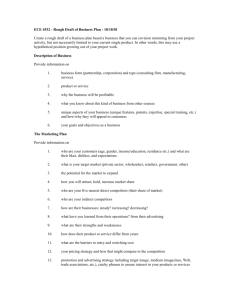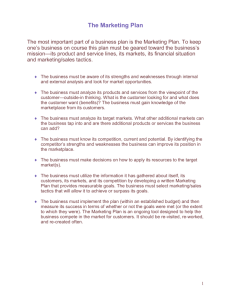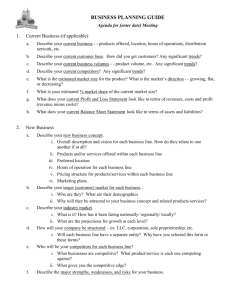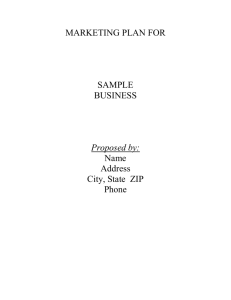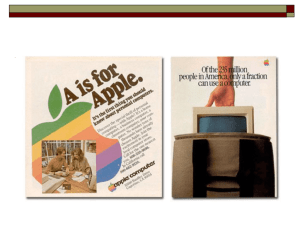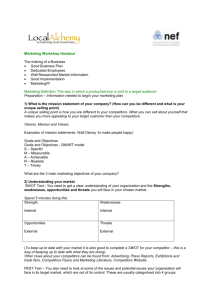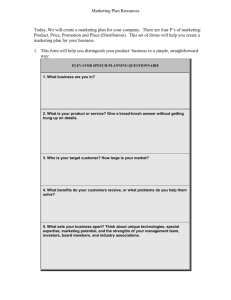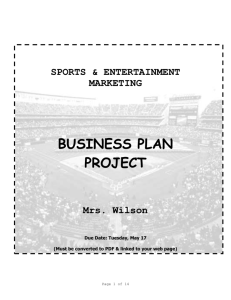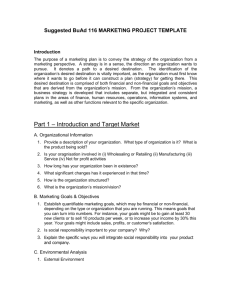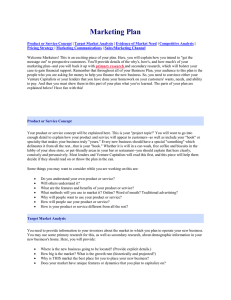Business Plan Blank Outline
advertisement
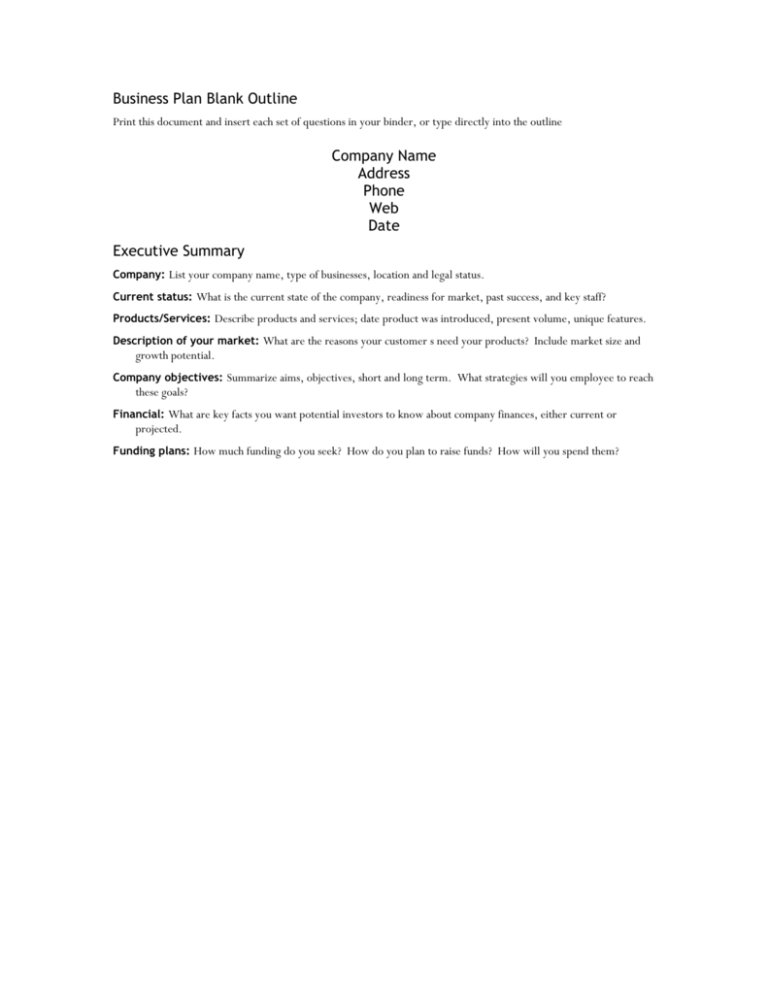
Business Plan Blank Outline Print this document and insert each set of questions in your binder, or type directly into the outline Company Name Address Phone Web Date Executive Summary Company: List your company name, type of businesses, location and legal status. Current status: What is the current state of the company, readiness for market, past success, and key staff? Products/Services: Describe products and services; date product was introduced, present volume, unique features. Description of your market: What are the reasons your customer s need your products? Include market size and growth potential. Company objectives: Summarize aims, objectives, short and long term. What strategies will you employee to reach these goals? Financial: What are key facts you want potential investors to know about company finances, either current or projected. Funding plans: How much funding do you seek? How do you plan to raise funds? How will you spend them? History and Position to Date Introduction to Your Business Background: How did you arrive at your business idea? Business Success Factors: What makes you believe it will succeed? Numbers that back up our business concept: Do you have numbers, such as market research, to back this up? What is the source of these numbers? List the important numbers. Last year's sales: Is your business operating? List last year's sales? Last year's net income: What was last year's net income before taxes? Achievements to date: Give brief details of your business's achievements to date. Mission, Vision, Values and Goals Mission: What is the purpose of your business? In particular, what customer need does it meet? Vision: What will your company look like in the years to come? For what do you want to be known? Values: What is important to you? What are the “non-negotiable” things you will not do or sacrifice to get a sale? Goals: Short and long-term hat do you want to achieve over the next one, three and years? Business Structure - What is your business structure and why was it chosen? Management Team - List names of top mangers; describe briefly their skills and experience. Leadership Team: President/CEO, Chief Financial Officer, Senior Marketing and Operations Experience: List relevant business experience Skills/qualifications: What relevant skills or qualifications do they have? Other key personnel: Are there other key personnel about whom you feel potential investors should know? If so, list them and describe their experience, successes, education and other strengths. Personnel to be added: Are there any personnel or skill gaps in your management team? If so, list the positions to be filled, qualifications sought, and approximate date to be added. Products and Services Describe your product or service as if explaining it to a novice Present sales volume: Is your product/service available for sale? If so, what is the present sales volume? Steps required to finalize the product for market: If it is not ready, describe what needs to be done. Cost to make product ready for market: How much will it cost? Time until ready for market: How long will it take to make your product or service ready for market? Patents: List any patents or trademarks you own or have applied for. Guarantees/warranties: Will you be offering guarantees or warranties? If so describe the scope of your program. o Cost to administer: If you offer a guarantee how much will it cost? o Benefits to company: What benefits do you gain by offering the program? Competitive advantages: Describe any special competitive advantages your product has. Market differentiation: How will you differentiate your product or service from those already on the market? Possible new or complementary products: What are the possibilities of developing new products or services complementary to those you have described above? Regulatory issues: Describe any regulatory issues facing your business, such as licenses or permits. Market Research Customers Geographic scope: What is the geographic scope of your market? Demographics: Describe demographics of target customers. Customer needs: What customer needs will your product or service satisfy? Innovators: Who are the innovators among target customers, the ones who will be first to buy? Market growth: What is the forecast growth trend for your overall market? Growth relative to local economy: How does it compare with general economic growth of your geographic area? Product Features – Relevance to target customer Feature: Describe the 3 most important features of your product or service from a customer’s perspective. Benefit to customer: How does your target customer benefit from each feature? Proof: How is your firm able to deliver the benefit? Customer Sensitivities Customers take many things into account when they decide what products to purchase, but some factors will carry more weight than others. Rate how important the following aspects of your product are to your target customer: Price Quality Appearance Variety of goods or services offered Packaging Size Fragility Ease of handling Transportability Operating characteristics Location and facilities Hours of business Delivery times Credit terms Reputation, Advertising and promotion Customer service Employee attitude or appearance Seasonal cycles Economic cycles (growth, recession). You can not do everything well. In your narrative focus on the elements which are most important to your customers. What will you do to insure you meet or exceed customer expectations on these key variables? Competitors List and briefly describe the businesses that are or will be your main competitors Competitors' products: Describe the competing products/services in comparison to your own Strengths and weaknesses, relative to us: What are your competitors' strengths and weaknesses relative to your business/ Strengths and weaknesses, relative to each other: What are your competitor’s strength and weaknesses relative to each other Complete a comparison table Critical factors for success: What are the critical factors for success in your business sector? Business Strategy Pricing Pricing Policy: Is your goal to be the price leader setting the price in the industry or the middle of the pack? Is your goal to skim only the top customers, or serve everyone? Pricing factors: Which of the following will be most likely to affect your decisions regarding pricing? Consumer Perceptions Competition Elasticity of Demand Company Policy Business Conditions Channels of Distribution Production Capacity Advertising and Promotion Long-term promotional goals: What are your long term promotional goals? Short-term promotional goals: What are your immediate plans for advertising and promoting your company? Marketing message: What is your marketing message? Media: What media will you use, and why Monitoring marketing effectiveness: How will you monitor the results of your advertising? Promotional budget: How much have you budgeted for advertising and other promotional activities? Location and Channel Factors in choosing location: Have you chosen a business location? What factors are important in your choice of location? Competitive advantages: What competitive advantage will factors give you? Distribution channels: Will you be selling through distribution channels - What channels of distribution are used in your field Channel: Which do you plan to use Reason for choice: Why do you plan to use these? Operations Sales and Sales Management Sales Team: Who will conduct the selling for your business? Training: Provide details of their training Sales methods employed: What sales methods will you employ Sales monitoring: How will you monitor and control your sales efforts Incentives: What incentives will be in place for sales staff to meet targets? Customer complaints: How will you handle customer complaints? Manufacturing/Supply Materials/supplies needed: What major items of purchased materials or services will you require Vendor(s): Who will you buy these from and why Terms of sale: What are your suppliers terms and conditions Production process: Describe the main points of the production process Competitors' production process: How do your competitors conduct their manufacturing? Note any significant differences from your processes Engineering/design support: What in the way of engineering and or design support will you require Facilities and equipment: What facilities and equipment will you need? Quality control: What quality control measures will your employ? Cost to become operational: How much do you need to spend in order to become fully operational? Staffing Issues Key positions: Summarize the key job descriptions Recruitment: If any key positions need to be filled describe how you plan to recruit and select these people Succession planning: Even new organizations should look to the future, what measures have you put in place to train successors for all key roles. What will happen to the business if the owner dies or retires? Dress code: Will you have a dress code? Other staffing issues: Note any staffing issues which are important to you business Business Controls Accounting System: What bookkeeping and accounting systems have you chosen Reason for choice: Why have you chosen this system? Auditors: Who will your auditors be Sales monitoring: Describe your records for monitoring sales activity Marketing records: What other marketing records do you plan to keep? Manufacturing/production: How important are these business controls with relation to your business Quality control: How will you control quality? Customer feedback/complaints: How will you solicit Customer Feedback? New product development: What procedures will you employ to monitor new product development projects? Critical Risks External factors: What external factors, trends or events could potentially adversely affect your business? (Loss of a major client, rise of competition, new regulations, major economic trend shift, natural disaster) Internal factors: What internal factors could potentially adversely affect your business? (Loss of key employee, injury or death of owner or one of the partners, technology failure, and theft) Risk protection: What steps have you taken to mitigate risks described above? Such as System backups, cross training, insurance policies, new customer acquisition activities Financials Forecasting Orders in hand: Do you have firm orders for your products, if so give details Past sales: Are you already selling? If so what are your past sales numbers Market research: What research have you done to support your sales forecast? Give numbers and sources Assumptions: What assumptions have you made? Projected market share: What market share does your forecast imply? Financial Statements Assets and liabilities: Describe your overall assists and liabilities Gross profit: What are your gross profit projections for years one - three? If you are already operating, show 2 – 3 years historical as well as 2 – 3. Key ratios: Analyzing your key ratios, what do they say about your projected business performance over the next five years? Cash flow: What are your annual cash flow projections? Break-even point: What is your break even point? Break-even assumptions: Describe the assumptions you have made to reach this break even projection Sensitivity Analysis - estimate effects of each of the following on break even point 10% drop in sales volume 10% rise in fixed costs 10% rise in cost of goods sold Financing Requirements Funds required: How much money do you need for start up Use of funds: What do you need financing for? List specific items or areas of your business requiring financing including amounts required for each Money from partners, investors: How much money are you and partners investing? Percent of equity that is borrowed: What % of equity is borrowed? Desired funding sources: Where do you expect to raise funds? Timing: When do you need funds Offer to investors: What deal do you propose to offer to a potential investor? Equity Split: How much equity are you prepared to sell? Exit routes: What exit routes will be available to potential investors?
